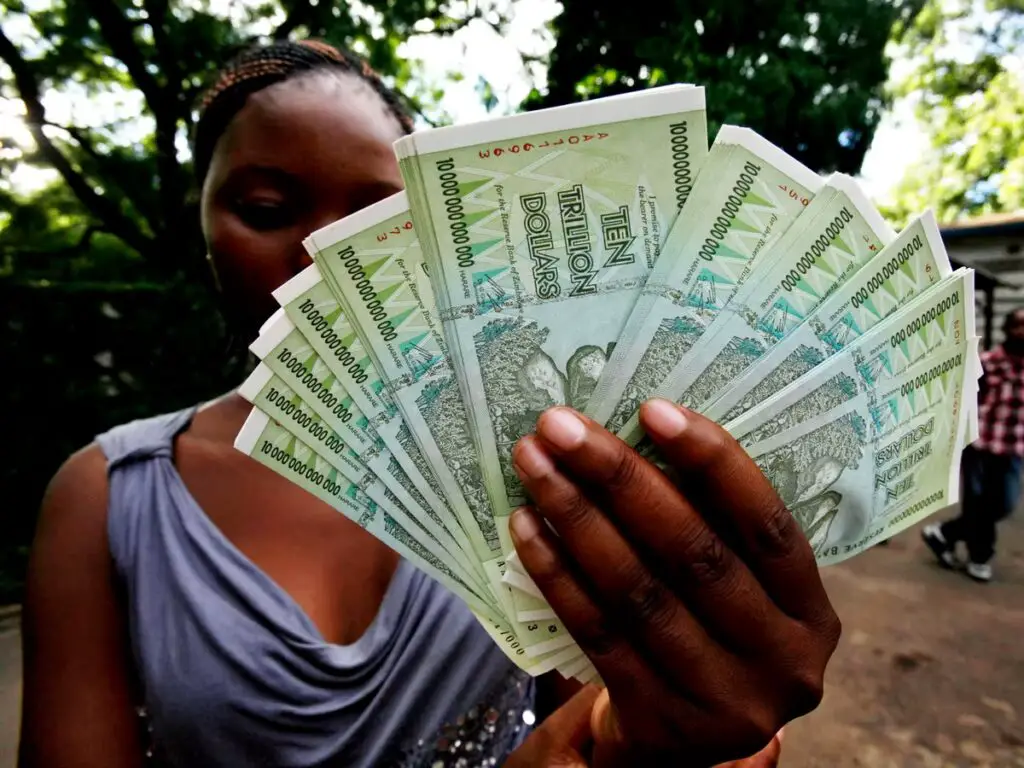- In the Central Business District of Harare, residents, mainly civil servants, wait in long lines to withdraw their wages.
- Citizens are spending the entire night waiting in line to get their hands on the money.
- The Karigamombe Centre, which houses three foreign exchange services, was packed with more than 1,000 individuals.
At the current exchange rate, 1 Zimbabwean Dollar is equal to 0.31277481 Kenyan Shillings which is equal to US$0.00883444.
While these numbers seem to be mind-boggling, they give a perspective of how badly affected the Zimbabwean currency is by inflation over a decade. With this devaluation, most Zimbabweans are suffering since it is almost worthless having their own currency.
As a result of a severe financial constraint, most Zimbabweans said they will forgo their traditional Christmas outings to the countryside.
Read: 6 business ideas for Christmas that don’t require a lot of money
In the Central Business District of Harare, residents, mainly civil servants, wait in long lines to withdraw their wages.
In many cases, folks spend the entire night waiting in line to get their hands on the money.
Only one of the Bureaux de change had enough money to give to 200 people on that particular day, according to a poll conducted by Newzimbabwe.com on Thursday.
The Karigamombe Centre, which houses three foreign exchange services, was packed with more than 1,000 individuals.
Since Thursday, I’ve been waiting in line.” We’ll have to come back tomorrow, according to the management. This implies that I’ll have to sleep in this queue again because if I leave, I’ll have to join it all over again,” one man stated.
People of all ages, including children, sleep in long lines without access to bathrooms, in direct contravention of Covid-19 requirements.
There is a terrible stink in the parking lot because they’ve changed the parcade into a restroom.
Some local residents believe that the facilities serve as a source of income for illegal traders.
Sometimes we hear that there’s money, but we’ve been in this queue since last week, so we’re curious to know who gets the money.
“It’s only two days before Christmas, but our plans to celebrate or enjoy the holiday have been destroyed since we have no money,” one Linos Maphosa was quoted by the New Zimbabwean.
Folks are selected at random, but we’ve been in wait for days and I feel like they already know these people they handpick from queues. Even though the central bank is providing them with funds, it is they who have contracted with illegal money changers to make the transactions possible. After spending days in queues, “we witness these crazy smart-dressed folks who walk and depart with money with no effort at all, however, we are dirty and ragged,” he said.
Read: To dollarize or not? Zimbabwe’s monetary headache
The Reserve Bank of Zimbabwe’s monetary policy committee (MPC) met in August and decided that bureaux de change should begin selling foreign currency to walk-in consumers.
However, demand for this service, which offers substantial rates on foreign currency to the general public, is outstripping supply.
People that contacted this magazine argued that the government should change its policy.
“We’re taking a break from work to join the line. How is production going to be achieved. More than 1000 people are expected, but only 200 will get daily stipends. In order for the government to put the money into our bank accounts, we should be able to withdraw it directly from our bank accounts. According to Maphosa, “This would end this crisis because 90 per cent of us are paid by banks.”
Havoc has broken out in the queues, and criminals have taken advantage of the chaos to strike. There is no need for me to deposit my money in these facilities since the RBZ can just transfer it to the account of my bank. Another man commented, “It lowers the strain.”
People in Zimbabwe can buy foreign currency at bureaux de change for about 10% of the official auction exchange rate, which is much lower than the black-market cost of around $230 to the dollar, according to MPC resolutions.
Small-value transactions that require real currency are becoming increasingly difficult for regular folks to pay for because of a widening difference between the official exchange rate and the black market rate.
During this time of year, demand for cash is expected to be high, which is why there are long lines at ATMs.
You can read the original article on New Zimbabwe.
